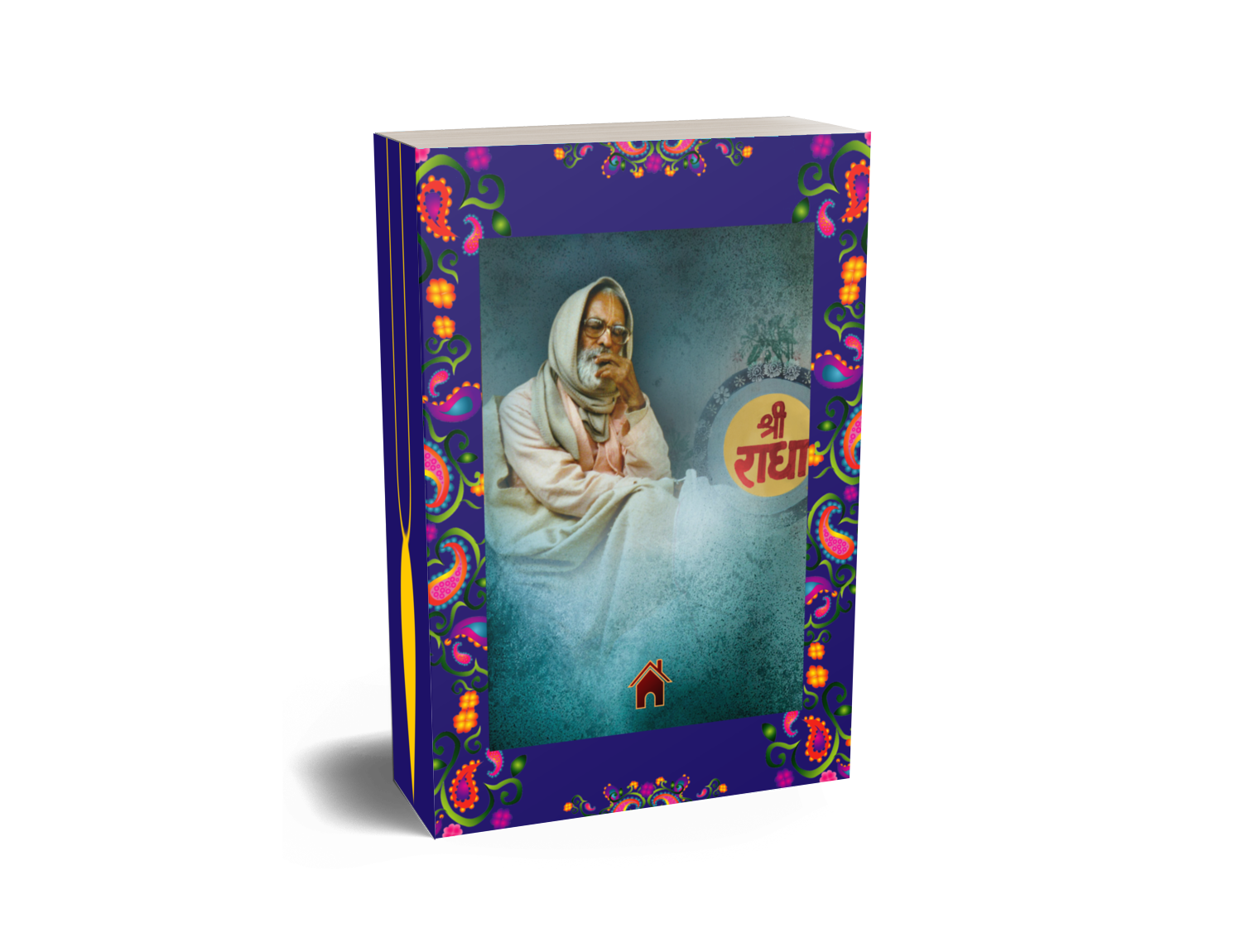

Chapter Ten from the book, Bhakti-rasāyana, 4th edition by Śrīla Bhaktivedānta Nārāyaṇa Mahārāja
yat-pāda-pāṁsur bahu-janma-kṛcchrato
dhṛtātmabhir yogibhir apy alabhyaḥ
sa eva yad-dṛg-viṣayaḥ svayaṁ sthitaḥ
kiṁ varṇyate diṣṭam ato vrajaukasām
Śrīmad-Bhāgavatam (10.12.12); Bṛhad-bhāgavatāmṛta (2.7.122)
Great yogīs perform severe austerities for many lifetimes, but even when with great difficulty they have completely controlled their minds, they still cannot attain even one particle of the dust of the lotus feet of Śrī Kṛṣṇa. How then can I possibly describe the good fortune of the Vrajavāsīs, who daily received His direct darśana?
Yogīs, through many births of practising yama, niyama, āsana, prāṇāyāma, pratyāhāra, dhāraṇā, dhyāna and 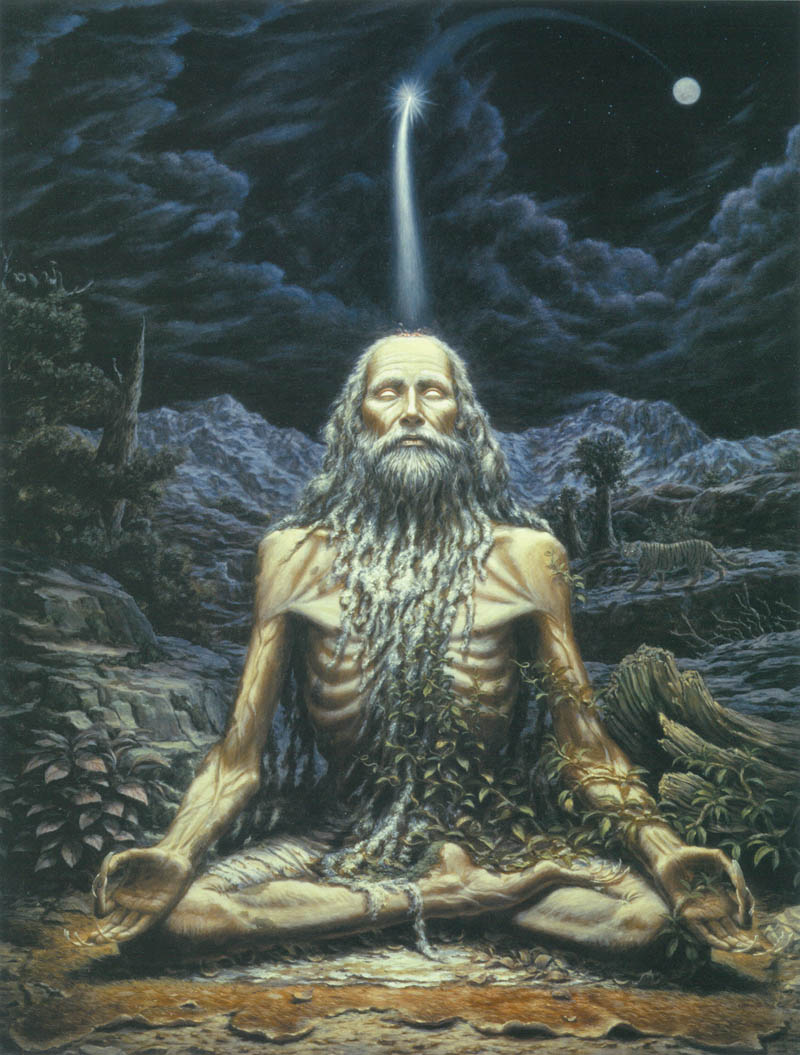 samādhi, are unable to touch even one particle of the dust of Kṛṣṇa’s lotus feet. They perform such severe austerities but are unable to reach Him, and this refers to Brahmā also. Brahmā has a very long lifespan, and he even sees Kṛṣṇa sometimes, but when he approached Kṛṣṇa, did he receive the dust of His feet? When Brahmā came to Vṛndāvana, Kṛṣṇa was absorbed in playing with His friends. When Brahmā arrived, Kṛṣṇa glanced at him, but then quickly returned to playing. Brahmā could only offer prayers and didn’t directly receive the dust of His feet. So what to speak of ordinary yogīs? But that very Vrajendra-nandana, although He is Bhagavān Himself, stands before the Vrajavāsīs and even plays with them. Even the children younger than Kṛṣṇa would desire to accompany Him when He took the cows out for grazing; they certainly wouldn’t just remain in their homes! The mothers of these children would tell Kṛṣṇa, “Look after my son today,” and Kṛṣṇa would take those small boys with Him. What to speak of just playing with them, after walking some distance, Kṛṣṇa would ask one of them, “Are you feeling tired?” and He would lovingly take him on His lap and begin massaging his feet.
samādhi, are unable to touch even one particle of the dust of Kṛṣṇa’s lotus feet. They perform such severe austerities but are unable to reach Him, and this refers to Brahmā also. Brahmā has a very long lifespan, and he even sees Kṛṣṇa sometimes, but when he approached Kṛṣṇa, did he receive the dust of His feet? When Brahmā came to Vṛndāvana, Kṛṣṇa was absorbed in playing with His friends. When Brahmā arrived, Kṛṣṇa glanced at him, but then quickly returned to playing. Brahmā could only offer prayers and didn’t directly receive the dust of His feet. So what to speak of ordinary yogīs? But that very Vrajendra-nandana, although He is Bhagavān Himself, stands before the Vrajavāsīs and even plays with them. Even the children younger than Kṛṣṇa would desire to accompany Him when He took the cows out for grazing; they certainly wouldn’t just remain in their homes! The mothers of these children would tell Kṛṣṇa, “Look after my son today,” and Kṛṣṇa would take those small boys with Him. What to speak of just playing with them, after walking some distance, Kṛṣṇa would ask one of them, “Are you feeling tired?” and He would lovingly take him on His lap and begin massaging his feet.
In this verse Śukadeva Gosvāmī says, “Aho! While taking the cows out to graze, Kṛṣṇa will sometimes even 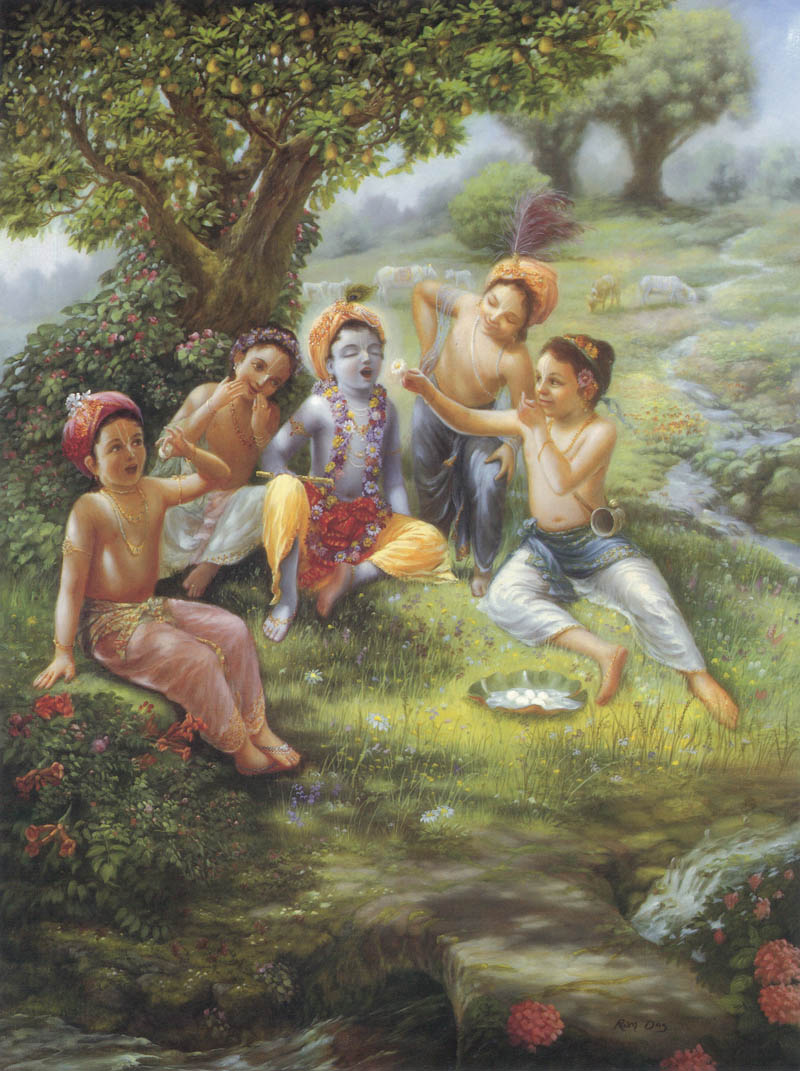 massage their feet! With His own hands He decorates the youthful cowherd boys, and they also decorate Him! They play games together, and when Kṛṣṇa is victorious He smiles with great joy. They eat together, and play jokes on one another – who can describe the good fortune of the Vrajavāsīs? Pāda-paṁśuḥ, the dust of Kṛṣṇa’s lotus feet, which even the yogīs are searching for in their meditation, falls from His feet and is spread all around as He jumps about, as His friends massage His feet and as He climbs the kadamba trees. And Yaśodā wipes away the dust from Kṛṣṇa’s face and applies fresh añjana to His eyes. And as He dances with the gopīs, with His own hands He wipes the dust from their lotus faces and places it on His head. Tell me, how glorious is that dust? Who can describe it?”
massage their feet! With His own hands He decorates the youthful cowherd boys, and they also decorate Him! They play games together, and when Kṛṣṇa is victorious He smiles with great joy. They eat together, and play jokes on one another – who can describe the good fortune of the Vrajavāsīs? Pāda-paṁśuḥ, the dust of Kṛṣṇa’s lotus feet, which even the yogīs are searching for in their meditation, falls from His feet and is spread all around as He jumps about, as His friends massage His feet and as He climbs the kadamba trees. And Yaśodā wipes away the dust from Kṛṣṇa’s face and applies fresh añjana to His eyes. And as He dances with the gopīs, with His own hands He wipes the dust from their lotus faces and places it on His head. Tell me, how glorious is that dust? Who can describe it?”
Quoting these verses in his Bṛhad-bhāgavatāmṛta, spiritual ecstasy swells in the heart of Sanātana Gosvāmī, as if he is churning cream and tasting its very essence. Then another feeling comes and he quotes this verse:
kvacit pallava-talpeṣu
niyuddha-śrama-karśitaḥ
vṛkṣa-mūlāśrayaḥ śete
gopotsaṅgopabarhaṇaḥ
Śrīmad-Bhāgavatam (10.15.16); Bṛhad-bhāgavatāmṛta (2.7.123)
Becoming fatigued from wrestling and playing, Kṛṣṇa spreads His feet out, and one sakhā, his heart melted with love and affection for Him, takes Kṛṣṇa’s feet on his lap. Millions of sakhās arrange millions of beds made of flowers for His comfort. Then, unknown even to Himself, by Yogamāyā, Kṛṣṇa expands into millions of forms and accepts the service of each one of them. Otherwise, if millions of sakhās all came at once to massage His feet, there would be competition and a great commotion. Therefore Yogamāyā arranges everything very beautifully so that there will not be any conflict. Underneath the cooling shade of a tree, the sakhās use their laps as pillows for Kṛṣṇa and gently lull Him to sleep.
pāda-saṁvāhanaṁ cakruḥ
kecit tasya mahātmanaḥ
apare hata-pāpmāno
vyajanaiḥ samavījayan
Śrīmad-Bhāgavatam (10.15.17); Bṛhad-bhāgavatāmṛta (2.7.124)
At that time, one greatly fortunate sakhā would massage His feet, and another would fan His body with a fan made of leaves.
Because they would massage Kṛṣṇa’s legs with great love, here the sakhās are referred to as mahātmās, great 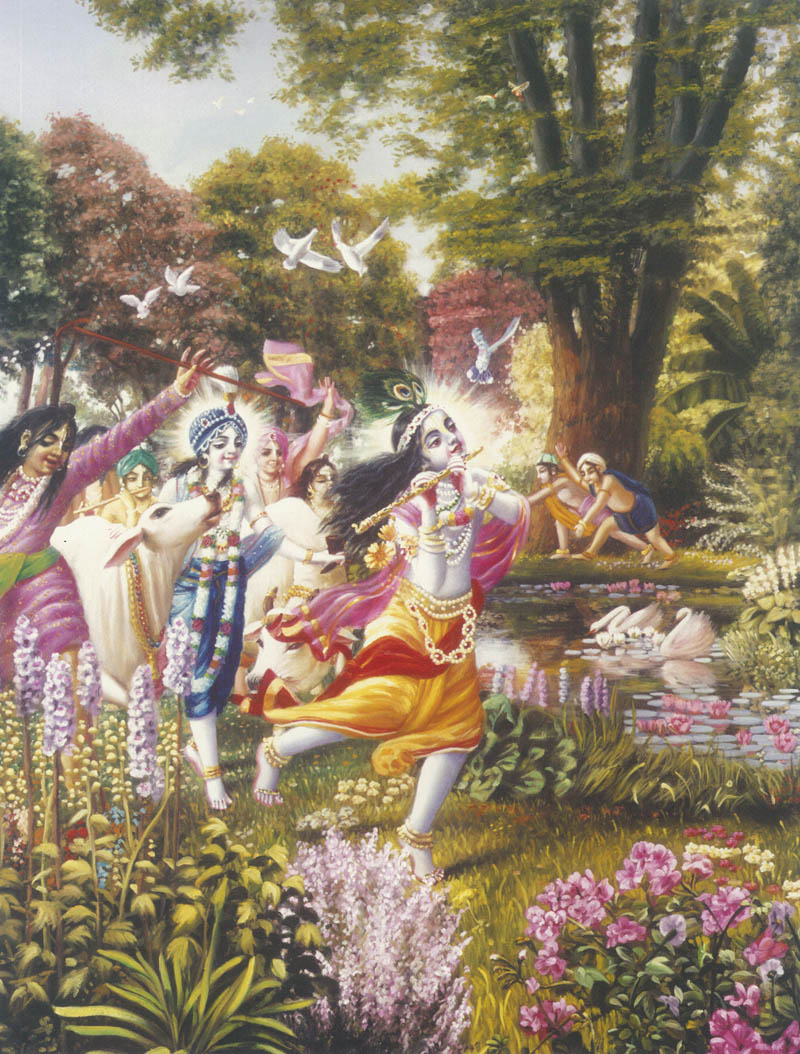 souls. There are millions of sakhās and all are exalted. Some would fan Him, but not with a cāmara; with a fan made of leaves and peacock feathers they would fan Him with great love. They serve Kṛṣṇa by providing their laps as pillows for His head – can such good fortune be seen anywhere else? Their affection for Kṛṣṇa is supremely natural in the mood of nara-līlā, considering Him to be an ordinary child. Seeing how Kṛṣṇa has exerted Himself in wrestling with them and in taking the cows out to graze, the sakhās serve Him with great affection to remove His exhaustion. When Kṛṣṇa was driving Arjuna’s chariot and the sharp arrows of Bhīṣma were piercing Him, did anyone on the battlefield feel any real pain because of that? But are the sakhās like this? To remove even one drop of perspiration from Kṛṣṇa’s brow they are prepared to give up their very lives.
souls. There are millions of sakhās and all are exalted. Some would fan Him, but not with a cāmara; with a fan made of leaves and peacock feathers they would fan Him with great love. They serve Kṛṣṇa by providing their laps as pillows for His head – can such good fortune be seen anywhere else? Their affection for Kṛṣṇa is supremely natural in the mood of nara-līlā, considering Him to be an ordinary child. Seeing how Kṛṣṇa has exerted Himself in wrestling with them and in taking the cows out to graze, the sakhās serve Him with great affection to remove His exhaustion. When Kṛṣṇa was driving Arjuna’s chariot and the sharp arrows of Bhīṣma were piercing Him, did anyone on the battlefield feel any real pain because of that? But are the sakhās like this? To remove even one drop of perspiration from Kṛṣṇa’s brow they are prepared to give up their very lives.
Because the sakhās are engaged in massaging Kṛṣṇa’s legs, they are described as mahātmās. Mahātmā means ‘a great soul’, and when does one become a great soul? When he attains the service of Kṛṣṇa – otherwise not. Here the word mahātmanaḥ can also be an adjective for Kṛṣṇa, who is full in six opulences and who, though being ātmārāma (self-satisfied) and āptakāma (without desire), still desires to accept service from others. Because He never really becomes exhausted, He does not need the beds of flowers arranged by the sakhās. If after fighting with so many demons and holding up Govardhana Hill for seven days He did not become exhausted, then how could playing with some small children exhaust Him? Thinking, “They have such sincere desires to serve Me that they have come running to Me?” Then – although He is Parabrahma and āptakāma – still He melts in emotion and lies down on the beds that they arranged and falls asleep. For this reason He is referred to as a mahātmā. Mahātmā can also mean ‘glories’, and Kṛṣṇa’s glories are the six opulences that He possesses.
Though it seems that these glories would not be exhibited as He is playing the part of an ordinary young boy in this nara-līlā, He manifests these opulences by expanding into millions of forms to accept service from each sakhā, and not even one sakhā knows of it. If Kṛṣṇa were to display to them that “I am the possessor of all opulences and can assume unlimited forms,” then becoming astonished, they would all begin offering prayers, and there would be no service for Kṛṣṇa to accept. Therefore He is mahātmanaḥ.
It is like when someone gives millions of rupees to charity but thinks nothing of it. This is the glory of giving 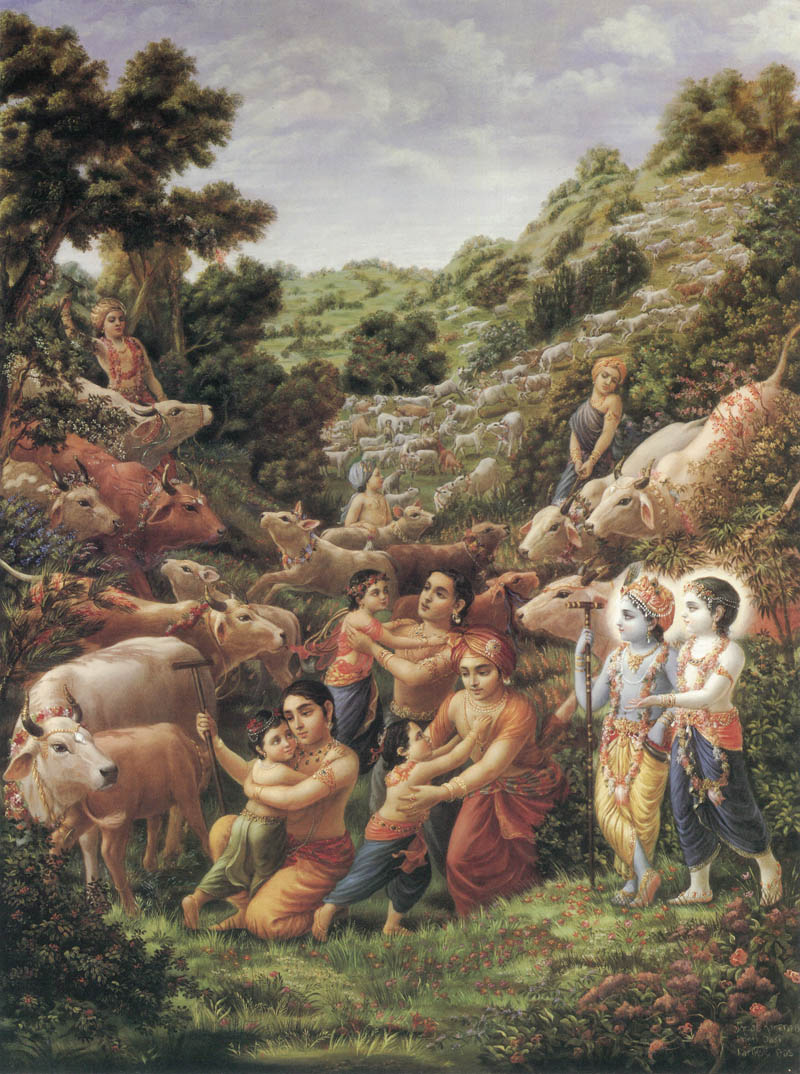 charity, but if someone gives something and then says to others, “Do you understand how much I have given?” then it is not glorious. Sudāmā didn’t consider what he gave Kṛṣṇa to be important, his wife didn’t consider it to be, and no one in the entire world would consider it to be anything substantial, but that offering was the most glorious.* In the same way, the sakhās are giving their everything, their prema, and because by manifesting His opulences Kṛṣṇa allows everyone to serve Him, He is mahātmanaḥ. In the rāsa-līlā He gave all of the gopīs an opportunity, and in the pastime of bewildering Lord Brahmā He gave all of the cows and older gopīs the chance to become His mother by expanding into so many forms, and in both līlās no one knew of it. Therefore in this verse the adjective mahātmanaḥ is more appropriate in referring to Kṛṣṇa.
charity, but if someone gives something and then says to others, “Do you understand how much I have given?” then it is not glorious. Sudāmā didn’t consider what he gave Kṛṣṇa to be important, his wife didn’t consider it to be, and no one in the entire world would consider it to be anything substantial, but that offering was the most glorious.* In the same way, the sakhās are giving their everything, their prema, and because by manifesting His opulences Kṛṣṇa allows everyone to serve Him, He is mahātmanaḥ. In the rāsa-līlā He gave all of the gopīs an opportunity, and in the pastime of bewildering Lord Brahmā He gave all of the cows and older gopīs the chance to become His mother by expanding into so many forms, and in both līlās no one knew of it. Therefore in this verse the adjective mahātmanaḥ is more appropriate in referring to Kṛṣṇa.
There are countless parties of sakhās that all have their respective leaders, and just as there are various kinds of gopīs, there are also five kinds of sakhās: sakhā, priya-sakhā, preṣṭha-sakhā, parama-preṣṭha sakhā and priya-narma-sakhā. Amongst them are thousands of parties, but there is never any conflict in their service. When the prime minister comes here, many congressmen say, “I will garland the prime minister!”, and there is a commotion. But there are millions of sakhās and there is never any conflict because Kṛṣṇa’s divine power (aiśvarya) is wonderful. Each sakhā thinks, “Today I am the most fortunate; Kṛṣṇa has given this good opportunity to me only because He loves me so much!” Yogamāyā arranges everything so that neither Kṛṣṇa nor the sakhās know what is happening, otherwise Kṛṣṇa won’t be able to taste the sakhya-rasa. But this way He can simply go on playing with the boys and tasting the rasa.
In this verse the words hata-pāpmānaḥ don’t mean ‘without sin’, because there is no possibility of sin in the  sakhās anyway. It means that they served Kṛṣṇa with melted hearts and great affection. Sometimes we serve with love, but mostly we serve because we feel that it is our duty. But if service is done out of pure affection, then Bhagavān will really desire our service. So hata-pāpmānaḥ means that the sakhās’ service was free from any feelings of duty, and with fans made of leaves and peacock feathers they softly fanned Kṛṣṇa to relieve His exhaustion. But it can also have one more meaning: by hearing descriptions of the lives of great devotees such as these sakhās, all of one’s sins will be eliminated, and for those whose internal forms are as sakhās, intense hankering for this type of service will arise within them.
sakhās anyway. It means that they served Kṛṣṇa with melted hearts and great affection. Sometimes we serve with love, but mostly we serve because we feel that it is our duty. But if service is done out of pure affection, then Bhagavān will really desire our service. So hata-pāpmānaḥ means that the sakhās’ service was free from any feelings of duty, and with fans made of leaves and peacock feathers they softly fanned Kṛṣṇa to relieve His exhaustion. But it can also have one more meaning: by hearing descriptions of the lives of great devotees such as these sakhās, all of one’s sins will be eliminated, and for those whose internal forms are as sakhās, intense hankering for this type of service will arise within them.
Seeing all of this in his internal identity as Lavaṅga-Mañjarī, Sanātana Gosvāmī is submerged in sakhya-rasa, thinking, “I would also like to become a sakhā and serve Kṛṣṇa in that intimate way.” Then he quotes the next verse:
anye tad-anurūpāṇi
manojñāni mahātmanaḥ
gāyanti sma mahā-rāja
sneha-klinna-dhiyaḥ śanaiḥ
Śrīmad-Bhāgavatam (10.15.18); Bṛhad-bhāgavatāmṛta (2.7.125
My dear Mahārāja, other sakhās would sing attractive songs appropriate for resting time, and all the cowherd boys’ hearts would melt in affection for Kṛṣṇa.
Some other boys then began singing charming songs that were tasteful to Kṛṣṇa. They sang songs of Kṛṣṇa’s 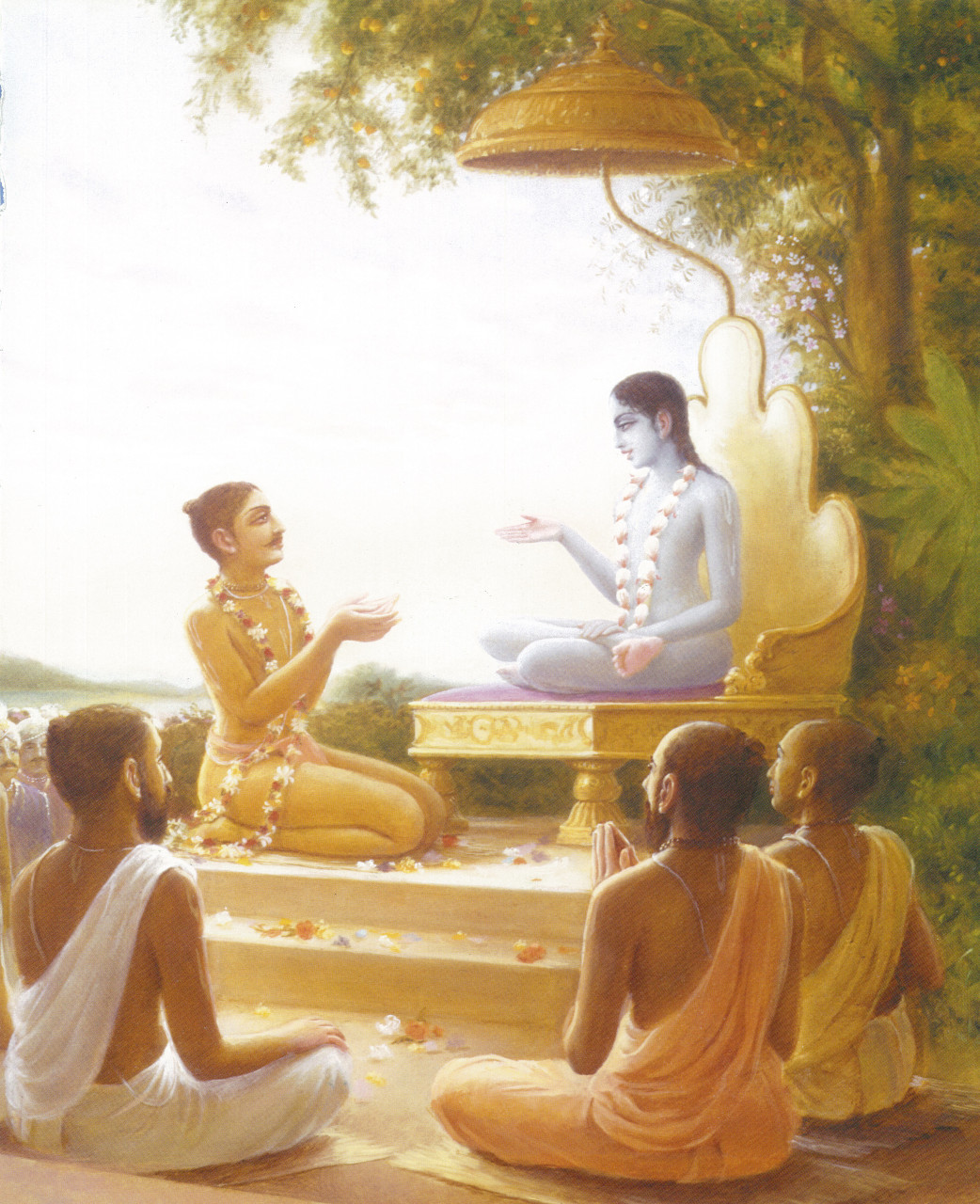 childhood pastimes that were manojña – so full of rasa that it caused Kṛṣṇa’s heart to overflow with blissful feelings. Here the word mahārāja refers to Parīkṣit Mahārāja, who being very rasika is the cause of Śukadeva Gosvāmī speaking such beautiful things.
childhood pastimes that were manojña – so full of rasa that it caused Kṛṣṇa’s heart to overflow with blissful feelings. Here the word mahārāja refers to Parīkṣit Mahārāja, who being very rasika is the cause of Śukadeva Gosvāmī speaking such beautiful things.
If Sanātana Gosvāmī had not come to this world, then such simple, beautiful and sweet explanations of these verses would have never been given. Even Śrīdhara Svāmī, the famous commentator on the Bhāgavatam, didn’t give explanations like Sanātana Gosvāmī’s; his explanations were mostly about vaidhī-bhakti and showing the difference between our philosophy and Advaitavāda. Śrī Caitanya Mahāprabhu respected Śrīdhara Svāmī’s commentary, and using that as a foundation, Sanātana Gosvāmī established Mahāprabhu’s beautiful transcendental sentiments of bhakti in his commentary on the Tenth Canto. Then Jīva Gosvāmī gave further light to that explanation with his Laghu-Vaiṣṇava-toṣaṇī commentary, and accepting both of those commentaries as remnants, Viśvanātha Cakravartī Ṭhākura extracted the rasa from them and composed his commentary. Hundreds of commentaries on the Bhāgavatam have been written, but none of them are as beautiful as his.
The cowherd boys, their hearts melted in great affection, sang beautiful songs for Kṛṣṇa’s pleasure. Seeing that Kṛṣṇa was fatigued, the sakhās made pillows of their laps and placed Kṛṣṇa’s head there. Kṛṣṇa never really becomes tired, but seeing their desire to render service He becomes fatigued. As Kṛṣṇa was lying like this, some were massaging His legs, others were rubbing His back, others were rubbing His head, and by looking at His face it appeared that He was resting comfortably and His fatigue was fading.
Sneha-klinna-dhiyaḥ means that with tears in their eyes and melted hearts, the gopas sang softly in such a way as to lull Kṛṣṇa to sleep. They sang songs related exclusively to Kṛṣṇa’s boyhood pastimes that would give Kṛṣṇa the most pleasure. Sanātana Gosvāmī says in his commentary that these boys’ voices were as beautiful as the birdsong of the koel. After all, they are eternal associates of Kṛṣṇa, so will they be any less expert than Him in singing? Madhumaṅgala and Subala could sing just as sweetly as Kṛṣṇa, just as Mahāprabhu’s associates could also sing very sweetly. They sang softly and sweetly to increase Kṛṣṇa’s pleasure, and they sang in the melody which was appropriate for the afternoon time.
Once, before Nārada had learned the art of singing, he went to the heavenly planets and began singing. The words of the song were good, but it was out of tune and the melody was not correct. Present there in heaven is the demigod of melody named Sura, and upon hearing Nārada singing out of tune he became physically deformed. Everyone there who heard Nārada’s singing felt pain in their hearts. Then someone approached him and said, “My friend, your singing has caused Sura and all of the beautiful singers present here to become ugly and deformed, so you should immediately go to Brahmā and learn the art of singing.”
So Nārada went to Brahmā, and Brahmā told him, “You should approach Sarasvatī and learn from her.” 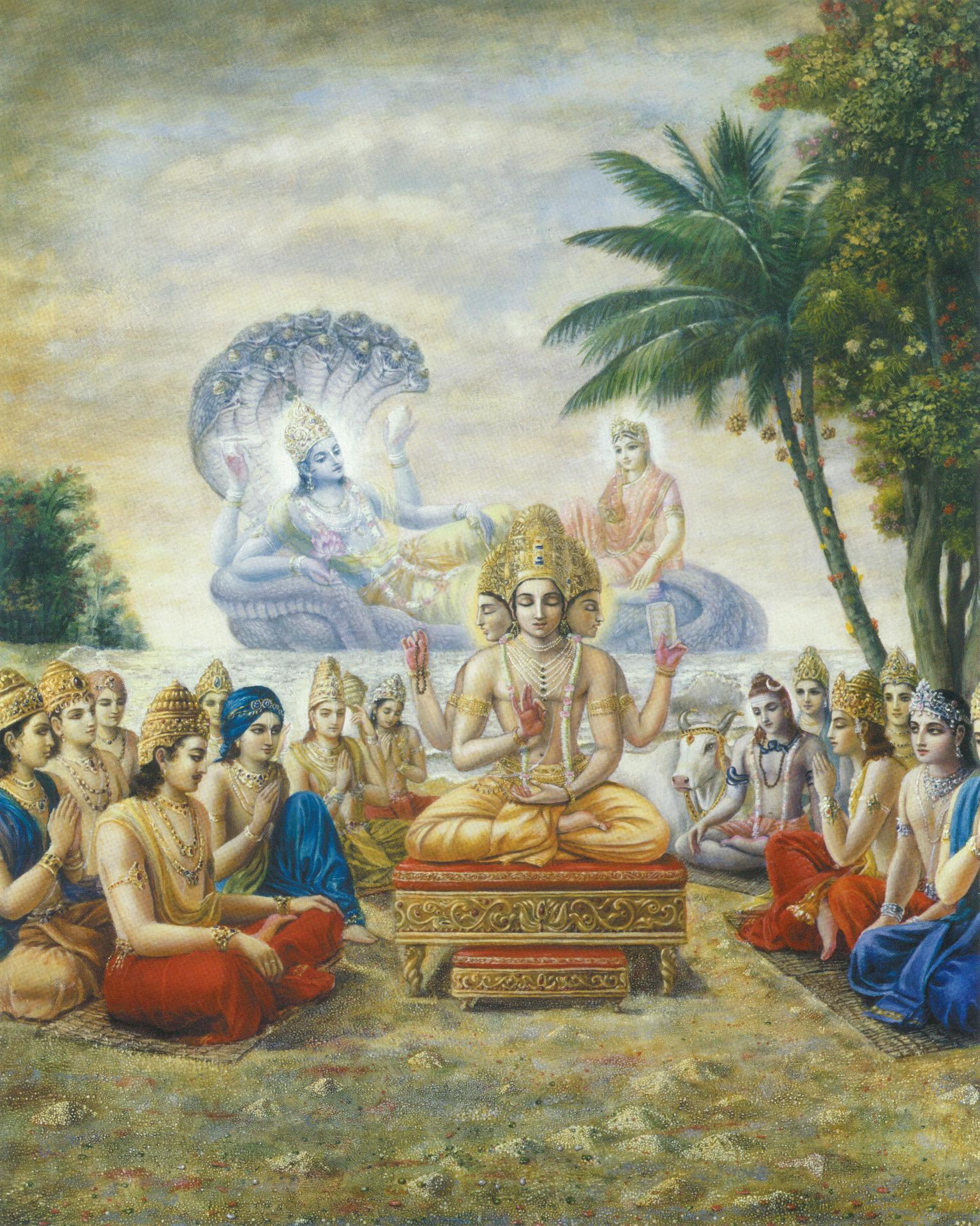 Sarasvatī taught him how to sing the appropriate melodies, and when he returned to the heavenly planets and sang again, all of the residents there were restored to their original forms. Then Nārada became the greatest preacher in the world of beautiful devotional songs. If in kīrtana the correct melody is not sung at the appropriate time, then it will be inauspicious. In the morning we sing a particular melody, and in the evening we sing a different one. If we don’t sing the appropriate melodies according to the time, then Sura, the demigod of melody, will suffer greatly. Those of us here who have to hear it will feel pain, and he will also feel pain.
Sarasvatī taught him how to sing the appropriate melodies, and when he returned to the heavenly planets and sang again, all of the residents there were restored to their original forms. Then Nārada became the greatest preacher in the world of beautiful devotional songs. If in kīrtana the correct melody is not sung at the appropriate time, then it will be inauspicious. In the morning we sing a particular melody, and in the evening we sing a different one. If we don’t sing the appropriate melodies according to the time, then Sura, the demigod of melody, will suffer greatly. Those of us here who have to hear it will feel pain, and he will also feel pain.
Knowing all the appropriate songs and melodies, the sakhās were all masters of singing. In the same way, Lalitā, Viśākhā, Tuṅgavidyā and all of the sakhīs are also experts in singing as well as in all other arts. The sakhās are not less skilful than Kṛṣṇa in singing ability, and they have the skill to slowly raise and again lower their pitch to create very wonderful melodies. This expertise cannot be attained in only one life; if someone has it, then we can understand that it is coming from previous lives.
Kṛṣṇa was resting with His eyes closed, and listening as the sakhās did wonderful things with gentle waves of sound. At that time Kṛṣṇa was more grave than millions of oceans, and for His pleasure the sakhās softly sang songs which, being saturated with bhakti, were very tasteful to Him. They sang songs describing the glories of His playful activities, the glories of Mother Yaśodā and the glories of the gopīs’ love for Him. In this way, their hearts full of rasa, they softly sang to Kṛṣṇa in the afternoon, and listening more and more with feelings of great bliss, Kṛṣṇa closed His eyes and became overwhelmed with prema.
When we offer food to Kṛṣṇa, what are our feelings? We chant the mantra, but is the necessary bhāva there, or 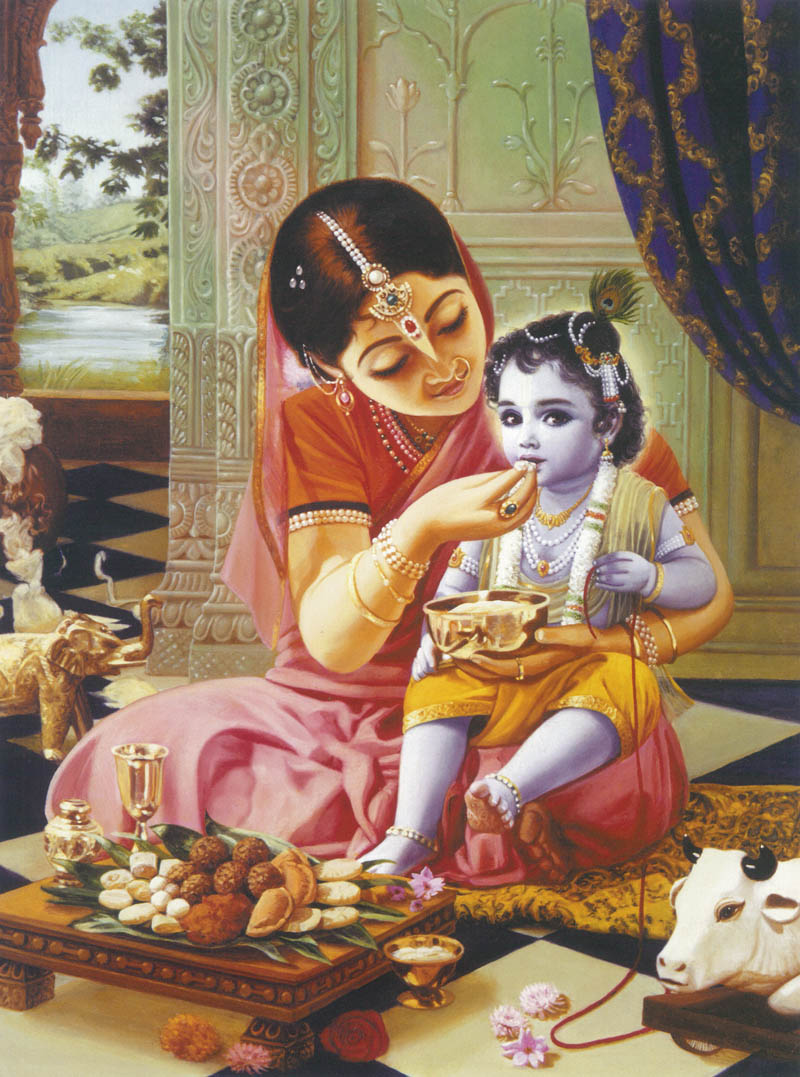 not? Our feelings should be like those of Mother Yaśodā, with great affection she seats Kṛṣṇa and pampering Him, begins to feed Him, saying, “Take a little of this, it is very nice… Here, take some of this, it is the nicest.” Tell me, then, with how much prema is she feeding Him? We should try to offer food to Kṛṣṇa with these feelings and sing kīrtana at that time with the feelings of Bhaktivinoda Ṭhākura. When we make an offering, we sing the songs he has written – “Bhaja bhakata-vatsala” and “Yaśomatī-nandana” – but generally we only memorise them and don’t consider the feelings within them. There are so many beautiful sentiments in those songs, and this is how the sakhās serve Kṛṣṇa – massaging Him with great affection and singing to Him with great bhāva. At once their hearts melted, and as Kṛṣṇa was listening, His heart also melted. Therefore Śukadeva Gosvāmī, being very rasika, said sneha-klinna-dhiyaḥ – Kṛṣṇa was overpowered by prema and rendered helpless. Once the singing started, even if someone wanted Kṛṣṇa to get up and move to another place, He couldn’t; being spellbound, He could only remain in the same position, with His heart melted and tears rolling down His cheeks. Seeing Kṛṣṇa like this, in this verse Śukadeva Gosvāmī has described Him using the word mahātmanaḥ.
not? Our feelings should be like those of Mother Yaśodā, with great affection she seats Kṛṣṇa and pampering Him, begins to feed Him, saying, “Take a little of this, it is very nice… Here, take some of this, it is the nicest.” Tell me, then, with how much prema is she feeding Him? We should try to offer food to Kṛṣṇa with these feelings and sing kīrtana at that time with the feelings of Bhaktivinoda Ṭhākura. When we make an offering, we sing the songs he has written – “Bhaja bhakata-vatsala” and “Yaśomatī-nandana” – but generally we only memorise them and don’t consider the feelings within them. There are so many beautiful sentiments in those songs, and this is how the sakhās serve Kṛṣṇa – massaging Him with great affection and singing to Him with great bhāva. At once their hearts melted, and as Kṛṣṇa was listening, His heart also melted. Therefore Śukadeva Gosvāmī, being very rasika, said sneha-klinna-dhiyaḥ – Kṛṣṇa was overpowered by prema and rendered helpless. Once the singing started, even if someone wanted Kṛṣṇa to get up and move to another place, He couldn’t; being spellbound, He could only remain in the same position, with His heart melted and tears rolling down His cheeks. Seeing Kṛṣṇa like this, in this verse Śukadeva Gosvāmī has described Him using the word mahātmanaḥ.
Śrīla Sanātana Gosvāmī has given still one more meaning here: mahātmanaḥ can also mean lampaṭa-śekhara, the king of debauchees. While Kṛṣṇa seems to be asleep, He is listening to the sakhās singing songs about His pastimes that are full of His mischievous pranks. Taking the gopīs’ clothes, He climbed a tree, leaving the poor girls shivering in the water and begging for their clothing back. He said, “You have all committed offences, so you must come before Me and beg forgiveness.” In beautiful, soft voices the gopas sang songs of pastimes like this and Kṛṣṇa’s blissful feelings at once increased.
Kṛṣṇa is supremely rasika, and He is sarvajña, the knower of all. But still, even though He knows what they will 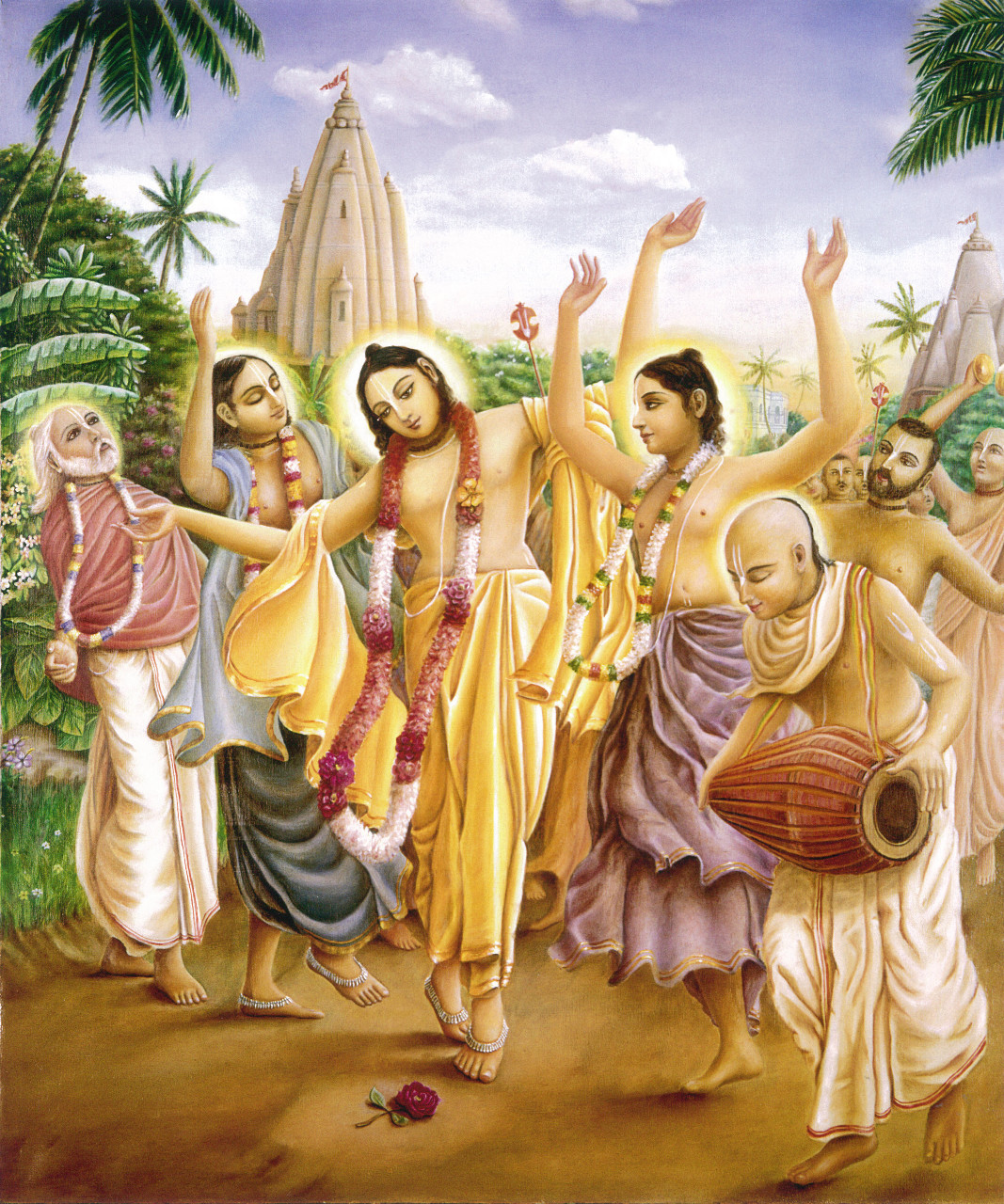 sing next before they sing it when He hears it He becomes overwhelmed with prema and tears begin to flow from His eyes. And He receives much more pleasure from their singing than He does from their massaging Him. Their singing makes Him rest comfortably – from this we can understand that kīrtana is the best service. Although all the cowherd boys were massaging Him and this certainly increased His prema, when their service included kīrtana, which is bhagavat-priya, the service most dear to Kṛṣṇa, see how wonderful His condition became! His prema increased until He was completely overwhelmed.
sing next before they sing it when He hears it He becomes overwhelmed with prema and tears begin to flow from His eyes. And He receives much more pleasure from their singing than He does from their massaging Him. Their singing makes Him rest comfortably – from this we can understand that kīrtana is the best service. Although all the cowherd boys were massaging Him and this certainly increased His prema, when their service included kīrtana, which is bhagavat-priya, the service most dear to Kṛṣṇa, see how wonderful His condition became! His prema increased until He was completely overwhelmed.
In this verse the word mahārāja appears. What is its meaning? Mahān rūpeṇa rājate – he who is radiant with some special splendour. He in whose mind the desire for worldly enjoyment doesn’t shine, but instead whose thinking is always resplendent with thoughts of bhagavad-bhakti, is called “Mahārāja”. Here it can refer to Parīkṣit Mahārāja, and it can also mean that these most charming pastimes of Kṛṣṇa with the sakhās are the mahārāja, or best of all līlās. If one hears and chants the descriptions of these pastimes where Kṛṣṇa is playing in His full glory with the sakhās, then he also becomes fully glorious and can also be called Mahārāja.
Hearing Śukadeva Gosvāmī describe how the sakhās relaxed Kṛṣṇa, how Kṛṣṇa’s heart was at once melted in affection, and how He became so overpowered that He was unable to even move, Parīkṣit Mahārāja said, “Aho! Who can conceive of their good fortune?” This description influenced him so deeply that tears began to glide down his cheeks, and his heart also melted. This is why in this verse Śukadeva Gosvāmī refers to him as Mahārāja: in its full form bhakti had entered his heart, and prema began to flow there. Seeing that he was fully qualified to hear the transcendental glories of the fortunate cowherd boys, Śukadeva Gosvāmī referred to him as “Mahārāja”.
The word mahārāja can also refer to those pastimes that are the best of all. Through their singing, the gopas are 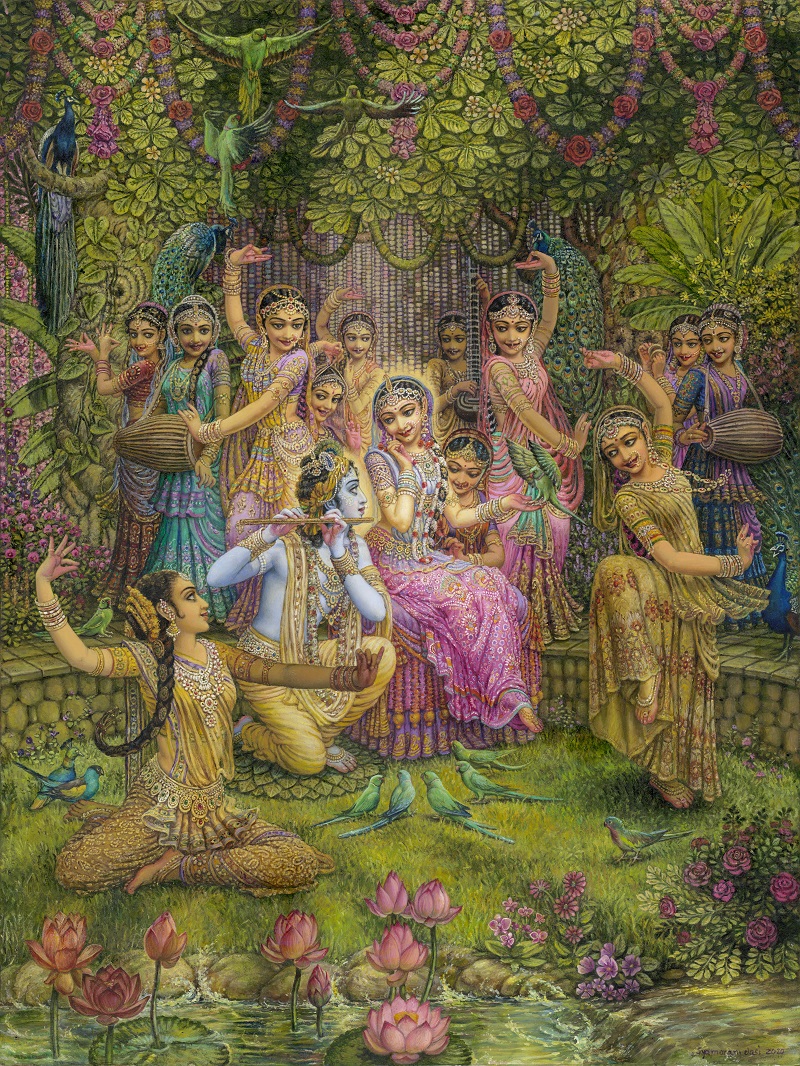 bringing remembrance of the gopīs to Kṛṣṇa. Being very pleased, Kṛṣṇa smiles from ear to ear, and then the sakhās also begin to smile, thinking, “He is appreciating what we are singing.” Mahārāja can also be an adjective to describe the cowherd boys, whose hearts are always saturated with simple, natural sakhya-bhāva. Being overwhelmed in their intimate service to Kṛṣṇa, they would experience anurāga, and sometimes even mahābhāva. In her vātsalya, Mother Yaśodā may sometimes experience anurāga, but she never experiences mahābhāva. But sometimes it comes to Madhumaṅgala, Subala, Śrīdāmā, Arjuna and other priya-narma-sakhās. Their pristine hearts are radiant with the wealth of rasa, they softly sing songs that increase the blissful ecstasy of both Kṛṣṇa and themselves.
bringing remembrance of the gopīs to Kṛṣṇa. Being very pleased, Kṛṣṇa smiles from ear to ear, and then the sakhās also begin to smile, thinking, “He is appreciating what we are singing.” Mahārāja can also be an adjective to describe the cowherd boys, whose hearts are always saturated with simple, natural sakhya-bhāva. Being overwhelmed in their intimate service to Kṛṣṇa, they would experience anurāga, and sometimes even mahābhāva. In her vātsalya, Mother Yaśodā may sometimes experience anurāga, but she never experiences mahābhāva. But sometimes it comes to Madhumaṅgala, Subala, Śrīdāmā, Arjuna and other priya-narma-sakhās. Their pristine hearts are radiant with the wealth of rasa, they softly sing songs that increase the blissful ecstasy of both Kṛṣṇa and themselves.
* This story is found in Śrīmad-Bhāgavatam, Tenth Canto, Chapter 81
Source: Purebhakti.com
Image(s) made possible by Pixabay.com, Krishnapath.org and/or Bhaktiart.net
Unless indicated differently, all verse translations and quotes are from the books by Śrīla Prabhupāda (Vedabase.com)









